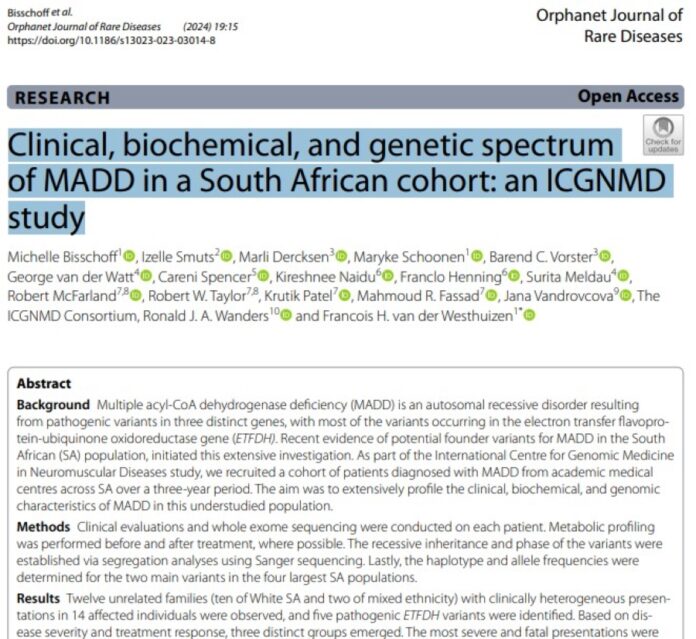July 2024: Paper of the Month by Bisschoff, et al 2024 – Study Uncovers Genetic Insights and Treatment Efficacy of MADD in South African Patients
A recent study by Bisschoff, et al (2024) titled “Clinical, biochemical, and genetic spectrum of MADD in a South African cohort: an ICGNMD Study” published in Orphanet Journal of Rare Diseases shows that Riboflavin and L-carnitine treatments improved or normalized urinary metabolic markers in most cases, except for the most severe types.
“
Patients exhibited a range of symptoms, from severe neonatal-onset to milder, later-onset forms, depending on the genotype. – Bisschoff, et al 2024
The current study explores Multiple Acyl-CoA Dehydrogenase Deficiency (MADD) within a South African cohort. MADD is a rare autosomal recessive metabolic disorder caused by pathogenic variants in three specific genes, most commonly ETFDH. This research aims to identify potential founder variants unique to the South African population. To achieve this, the study employs a comprehensive approach, including clinical evaluations, whole exome sequencing, and metabolic profiling of affected patients. Additionally, segregation analyses and haplotype determination are utilized to understand the genetic inheritance and population-specific characteristics of the disorder. The study’s findings are significant: Five pathogenic variants in the ETFDH gene were identified among 14 individuals from 12 different families. These individuals were categorized into three distinct groups based on the severity of their disease and their response to treatment. This research represents the first extensive genotype-phenotype characterization of MADD in the South African population. The insights gained from this study are crucial for improving early screening processes, offering precise genetic counseling, and tailoring patient-specific treatments. By understanding the genetic underpinnings and clinical manifestations of MADD in this population, healthcare providers can enhance patient care and outcomes.
How the study was conducted
Patients diagnosed with MADD were recruited from academic medical centers across South Africa over a three-year period. Each patient underwent clinical evaluations and whole exome sequencing. Metabolic profiling was performed before and after treatment, where possible. Segregation analyses using Sanger sequencing were employed to establish the recessive inheritance and phase of the variants. The haplotype and allele frequencies for the two main variants were determined in the four largest South African populations.
What the authors found
Five pathogenic ETFDH variants were identified in the South African cohort, with the most severe cases linked to the homozygous c.[1067G>A] and compound heterozygous c.[976G>C];c.[1067G>A] genotypes.
The authors also found that patients exhibited a range of symptoms, from severe neonatal-onset to milder, later-onset forms, depending on the genotype. Also, Riboflavin and L-carnitine treatments improved or normalized urinary metabolic markers in most cases, except for the most severe types.
Why is this important
Population-Specific Insights: By focusing on a South African population, the study provides valuable information about the prevalence, genetic variants, and clinical presentations of MADD in this specific group. This knowledge can guide early screening, genetic counseling, and personalized treatment approaches.
Founder Variants: The identification of potential founder variants sheds light on the historical origins of MADD in South Africa. Understanding these variants can help trace the disease’s ancestry and inform future research.
Clinical Implications: The study’s findings impact patient care. Knowing which variants are associated with severe neonatal-onset forms versus milder, later-onset forms allows clinicians to tailor treatment strategies accordingly.
Riboflavin and L-Carnitine Treatment: The positive response to riboflavin and L-carnitine treatments in most cases highlights potential therapeutic options. However, the study also underscores that these treatments may not be effective for the most severe types of MADD.
What the authors recommended
- The authors advocate that, given the population-specific variants identified; genetic counseling services should be available to affected families. Early screening for MADD in high-risk populations can help identify carriers and affected individuals.
- The authors suggest that clinicians should consider riboflavin and L-carnitine supplementation for patients with MADD. However, they should be cautious when treating the most severe forms, as these treatments may not yield significant improvements.
- Regular follow-up evaluations are crucial to monitor treatment response, disease progression, and potential complications. Long-term management plans should be individualized based on genotype and clinical severity.
- The author recommends that raising awareness about MADD within the South African medical community and among affected families is essential. This includes educating healthcare providers about the clinical spectrum, diagnostic approaches, and available treatments.
In conclusion, the study by Bisschoff et al. represents a significant advance in understanding Multiple Acyl-CoA Dehydrogenase Deficiency (MADD) within the South African population. By identifying five pathogenic variants in the ETFDH gene and categorizing patients based on disease severity and treatment response, the research offers crucial insights into the genetic underpinnings and clinical manifestations of MADD. These findings underscore the importance of early screening, genetic counseling, and personalized treatment approaches, particularly the use of riboflavin and L-carnitine. The study highlights the need for ongoing education and awareness among healthcare providers and affected families to enhance patient care and outcomes.

















 The African Research (AR) Index is a comprehensive scholarly directory and database focused explicitly on journal publishers that publish and disseminate African research.
The African Research (AR) Index is a comprehensive scholarly directory and database focused explicitly on journal publishers that publish and disseminate African research.

